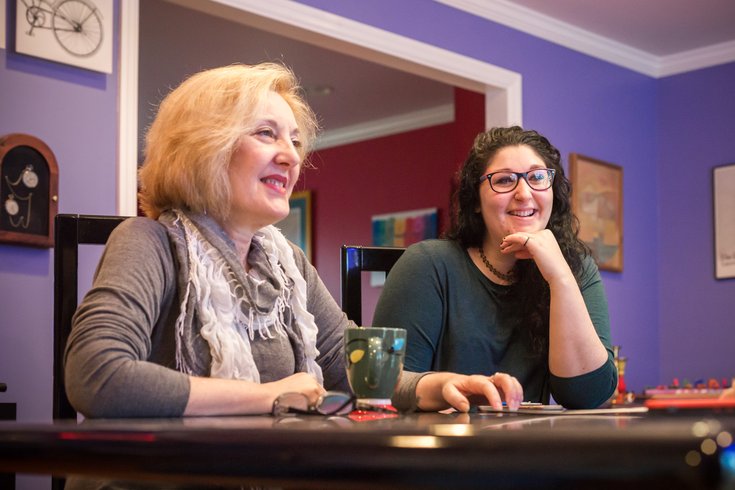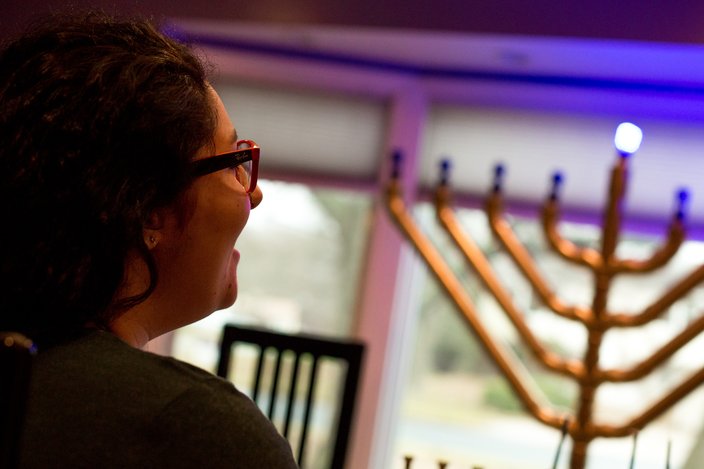
December 28, 2016
 Thom Carroll/PhillyVoice
Thom Carroll/PhillyVoice
Rowan University sophomore, Jardin Cassell and her mother, Tobi Schwartz-Cassell, of Cherry Hill, sit at the family's dining room table during a recent interview with PhillyVoice.
The transition from dependent child to independent young adult is tricky in the best of circumstances.
A month or so at home from college over the long winter break can kick that up a few notches for parents and students.
“For many families, the first time their children return for an extended stay at home can result in new conflicts and struggles to be resolved,” explains professor Lisa Farkas of the Psychology Department at Rowan University in South Jersey.
Students “were aware of household rules and expectations. Once they moved into their dorm, they were free to live their life in any way they chose,” Farkas says.
“This period of emerging adulthood is an exciting time,” adds Farkas, a licensed psychologist who has spent close to three decades working with young adults, children, adolescents and families.
The physical and emotional separation experienced by both parents and children is a challenge long recognized, and not just by psychologists.
Jardin Cassell, a sophomore at Rowan University, is celebrating Hanukkah with her family in their Cherry Hill, NJ home.
About 70 years ago, author Robert Penn Warren wrote that a visit home “is very much like diving into the octopus tank at the aquarium,” with parents trying to “get as big a chunk out of you as they can.”
Writer Thomas Wolfe went a step further, with a book titled, “You Can’t Go Home Again.” Wolfe spelled out the title’s meaning in this passage: “You can't go back home to your family, back home to your childhood … back home to the old forms and systems of things which once seemed everlasting but which are changing all the time.”
“Some parents experience this as a loss, but it should really be celebrated for what it is: a job well-done,” explains Farkas, who has walked-the-talk. She has a young adult child living in New York and 20-year-old university student who will be home for the long winter break.
One of the thorniest issues is tradition – and how to create new traditions that work for everyone, Farkas says.
The holidays are particularly tradition-laden, thick with ritual and repetition: the same foods and beverages, the same décor, the same circle of family and friends, the same religious celebrations.
For parents, that is often comforting. For young adult students, that can become confining.
“The most important thing to remember is that you love one another, and your child’s process of becoming an independent adult is just another developmental milestone, like learning to walk or going through puberty." – Psychologist Lisa Farkas
“Many people, especially parents, live for tradition. Other families want to do something new, especially children who have their own identities,” Farkas says, and ultimately the answer tends to be a compromise built on “love and respect,” meant to make both parents and students happy.
Which is about how mom, Tobi Schwartz-Cassell of Cherry Hill, dad, Stan Cassell, and daughter, Jardin Cassell, a Rowan University sophomore, have adapted.
Unlike some students and parents, Jardin has been back home frequently since she lives just 22 miles away and has a weekend job in Cherry Hill.
She also helps her mom with her home-based business, Franks and Beans Events. The business, which does such things as girls’ nights out painting parties, meant “learning to suck it up, even when we were clashing,” to assure that clients remain happy.
That working experience has helped Jardin and her mother negotiate disagreements and disappointments – like an upcoming tradition, New Year’s Eve – that is changing.
New Year’s parties are a family tradition, begun by Schwartz-Cassell’s parents. And the party has a had double meaning since Jardin was born, as New Years Day is also Jardin’s birthday.
But for the first time ever, Jardin will be holding her own New Year’s Eve party at the on-campus apartment in Glassboro she now thinks of as her home.
But she’ll pop in to Cherry Hill for her birthday celebration – a compromise that works for her and her family.
“I still have my room and my bed here [in Cherry Hill] but it doesn’t feel like home. Everything of mine is there [at Rowan]. My life is there,” Jardin said during one of her frequent stops to see her parents.
Farkas has some tips and advice for students and parents during the remaining break:
Limits, such as on screen time and curfews, need to be reasonable.
Students will likely be focused on reconnecting with friends, not with distant family.
Both sides must realize that expectations and pre-college patterns will have changed.
And finally:
“The most important thing to remember is that you love one another, and your child’s process of becoming an independent adult is just another developmental milestone, like learning to walk or going through puberty.
“Communication, consideration, and compromise are the keys to navigating the issues,” Farkas says.
 Thom Carroll/PhillyVoice
Thom Carroll/PhillyVoice